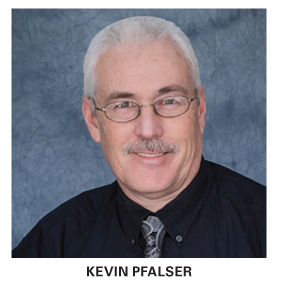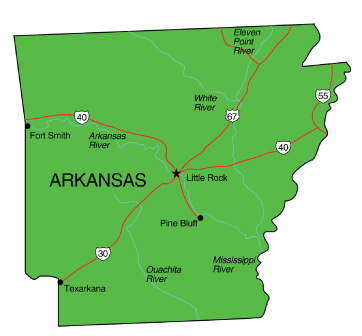Friday, June 15, 2018
Under most state governments there is an agency that regulates the LP-gas industry. A few states, such as Arkansas, have an LP-gas board that is fully funded by propane industry members through fees, licenses, and fines. A couple of years ago, Kevin Pfalser became only the third director of the Arkansas LP-Gas Board since its founding in 1957. Prior to Pfalser’s hiring, Sharon Coates had led the board since 1980. Previously an inspector, she was the first woman director of an LP-gas board in the U.S. The first Arkansas director was Harry Burns, previously a leader of the Boiler Board, a panel that regulated propane along with butane until the state’s LP-gas board was formed specifically for propane by the Arkansas Legislature in 1957. 
According to Rohn Craft, a longtime board member, Pfalser was hired because of his strong background in the intricacies of propane regulation through his 23 years of experience with Gas Equipment Co. and experience prior to that with Ferrellgas. “Kevin is definitely a get it done guy,” Craft said. “The board has always been run well and Kevin has been able to build on our strengths.” Another board member, David Remy of Arkansas Liquefied Gas Co., is a new to the board, although his brother served for many years.
“The board is very pleased with Kevin,” Remy said. “He’s taken great strides to boost compliance. That’s helped a bunch. Through new technology, he’s been able to lead the process of having inspections done via a hand-held device. Pictures can be taken and uploaded to reports and this can be easily added to a customer’s file.
”The makeup of the Arkansas LP-Gas Board includes seven members, one from each of the four Arkansas congressional districts and three at-large members. “One member, a consumer board member, is from outside the propane industry,” Pfalser said. “As for the staff, there are six of us. In addition to me, there is a business manager, an administrative assistant, and three inspectors.” The inspectors complete more than 500 inspections annually, carefully looking at bobtails, storage facilities, and dispensers.
“We’ve already signed 442 permits so far in 2018 and issued 2771 certifications or re-certifications,” Pfalser said. In addition, all Class I employees are required to complete a weeklong 40-hour training course.While the board is pleased with Pfalser’s results so far, he is anxious to complete a new website he has been working on for six months now. It still hasn’t gone live. “This was supposed to take 90 to 100 days,” he said. “It seems there are always urgent matters involving marketers that keep pushing this project to the back burner.”
According to Craft, one current issue has been with bottle re-fillers. “They have not been filling cylinders like they should,” he said. “They have not been using the scales as they should, and too often systems were overfilling.” The board is now cracking down on re-fillers, imposing fines for allowing overfilling to occur. In addition, Craft, Remy, and Pfalser have discussed that the Arkansas LP-Gas Board has never officially adopted NFPA 58. “We are mostly in agreement with NFPA 58,” Craft said. “In many ways we go a step further. An example would be the requirement that tanks holding more than 30 gallons of propane must be at least 10 feet from the house.
”However, Pfalser doesn’t believe the LP-Gas Board will adopt NFPA 58 anytime soon. “Our current administration is working to reduce regulation in all industries. I don’t believe the governor and his staff want any more regulations than we already have,” he said. “At the same time, we are going through a phase again where multi-state marketers are acquiring more small businesses in Arkansas. Since multi-state marketers use NFPA 58, they would like to see us move toward NFPA 58.” Do Arkansas marketers feel better paying for their own regulatory process rather than have the state fund and control it? “I think it is worth the cost,” says Remy. “It is better to have people who have worked in the industry and have the knowledge to understand what is required.” —Pat Thornton

According to Rohn Craft, a longtime board member, Pfalser was hired because of his strong background in the intricacies of propane regulation through his 23 years of experience with Gas Equipment Co. and experience prior to that with Ferrellgas. “Kevin is definitely a get it done guy,” Craft said. “The board has always been run well and Kevin has been able to build on our strengths.” Another board member, David Remy of Arkansas Liquefied Gas Co., is a new to the board, although his brother served for many years.
“The board is very pleased with Kevin,” Remy said. “He’s taken great strides to boost compliance. That’s helped a bunch. Through new technology, he’s been able to lead the process of having inspections done via a hand-held device. Pictures can be taken and uploaded to reports and this can be easily added to a customer’s file.
”The makeup of the Arkansas LP-Gas Board includes seven members, one from each of the four Arkansas congressional districts and three at-large members. “One member, a consumer board member, is from outside the propane industry,” Pfalser said. “As for the staff, there are six of us. In addition to me, there is a business manager, an administrative assistant, and three inspectors.” The inspectors complete more than 500 inspections annually, carefully looking at bobtails, storage facilities, and dispensers.
“We’ve already signed 442 permits so far in 2018 and issued 2771 certifications or re-certifications,” Pfalser said. In addition, all Class I employees are required to complete a weeklong 40-hour training course.While the board is pleased with Pfalser’s results so far, he is anxious to complete a new website he has been working on for six months now. It still hasn’t gone live. “This was supposed to take 90 to 100 days,” he said. “It seems there are always urgent matters involving marketers that keep pushing this project to the back burner.”

According to Craft, one current issue has been with bottle re-fillers. “They have not been filling cylinders like they should,” he said. “They have not been using the scales as they should, and too often systems were overfilling.” The board is now cracking down on re-fillers, imposing fines for allowing overfilling to occur. In addition, Craft, Remy, and Pfalser have discussed that the Arkansas LP-Gas Board has never officially adopted NFPA 58. “We are mostly in agreement with NFPA 58,” Craft said. “In many ways we go a step further. An example would be the requirement that tanks holding more than 30 gallons of propane must be at least 10 feet from the house.
”However, Pfalser doesn’t believe the LP-Gas Board will adopt NFPA 58 anytime soon. “Our current administration is working to reduce regulation in all industries. I don’t believe the governor and his staff want any more regulations than we already have,” he said. “At the same time, we are going through a phase again where multi-state marketers are acquiring more small businesses in Arkansas. Since multi-state marketers use NFPA 58, they would like to see us move toward NFPA 58.” Do Arkansas marketers feel better paying for their own regulatory process rather than have the state fund and control it? “I think it is worth the cost,” says Remy. “It is better to have people who have worked in the industry and have the knowledge to understand what is required.” —Pat Thornton

